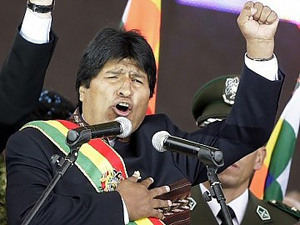
Morales, Opposition Reach Preliminary Deal on Bolivia Elections
April 14, 2009 - Latin American Herald Tribune
LA PAZ -- Representatives of Bolivia's governing socialists and right-wing opposition reached initial agreement Monday on a bill authorizing early presidential and congressional elections on Dec. 6, spokespersons for both sides said.
After more than 24 hours of talks, a commission comprising lawmakers from all parties and members of President Evo Morales' administration produced draft legislation that will be submitted to Congress for an article-by-article vote.
Morales launched a hunger strike last Thursday to force Congress to enable early elections, which are required by the new Constitution Bolivians approved in a January referendum.
Now more than three years into a five-year term, the first indigenous president of the majority-Indian nation plans to seek a renewed mandate that would allow him to remain in office until 2014.
Congress has already missed the deadline set by the new national charter for passing a law to regulate December's presidential and legislative elections and the gubernatorial and mayoral balloting set for April 2010.
While the socialists have a solid majority in the lower house, government opponents control the Senate.
Morales was elected in December 2005, garnering nearly 54 percent of the vote in a field of 11 candidates that included Quiroga and cement mogul Samuel Doria Medina, both of whom far outspent the socialist hopeful.
In recall referendums held last summer, Morales and Vice President Alvaro Garcia Linera were confirmed in office with around 67 percent of the vote.
The Constitution approved in January aims to empower Bolivia's Indian majority and narrow the 90-1 gap in wealth between the richest and poorest sectors of the population.
Opposition to the new charter was strongest in the eastern, lowland provinces of Santa Cruz, Beni, Tarija and Pando, where public life is dominated by mainly white business elites.
One of those regions, Tarija, also holds the lion's share of the estimated 48 trillion cubic feet of natural gas that constitute's Bolivia's main resource.
Last August, militants demanding virtual independence for the lowland provinces stormed government buildings, blocked roads and attacked energy facilities. EFE